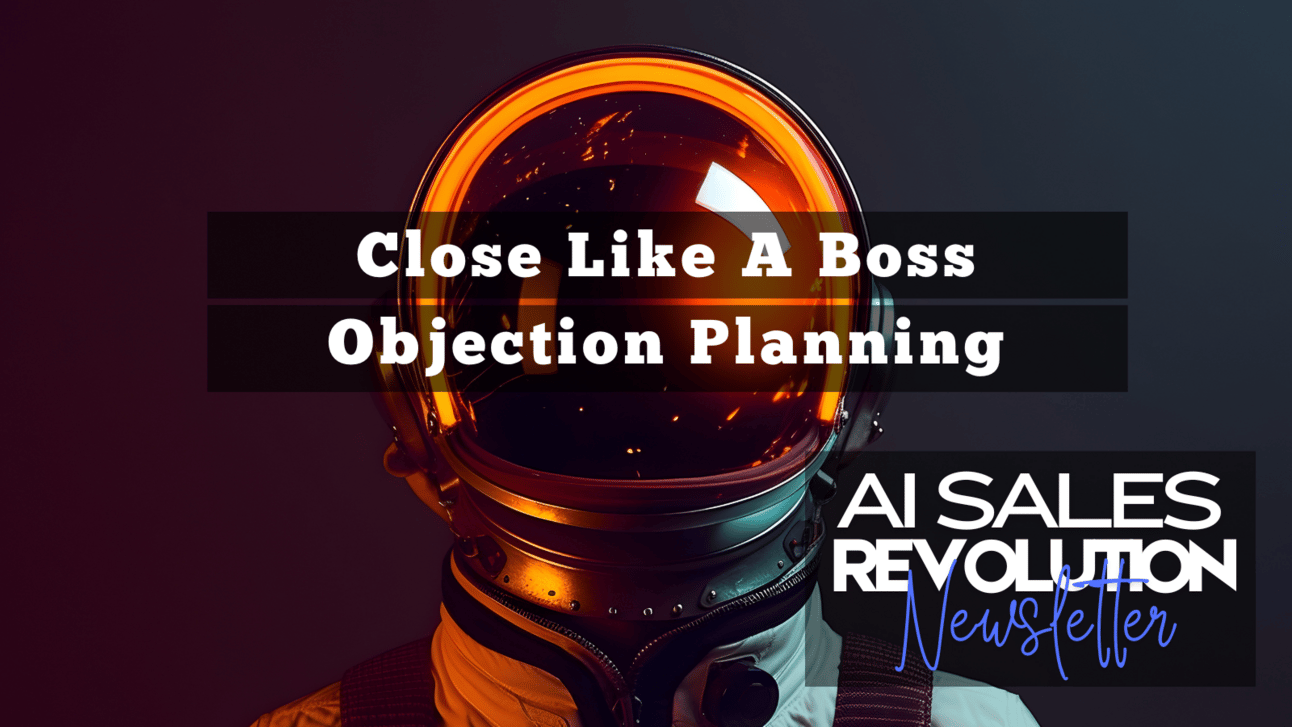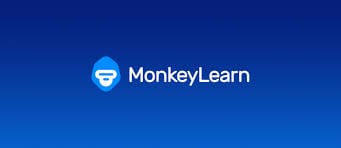- AI Sales Revolution
- Posts
- 🚀 Close Deals Like A Boss: AI Sales Intelligence That Closes Deals"
🚀 Close Deals Like A Boss: AI Sales Intelligence That Closes Deals"
Know Your Prospects’ Objections ... Before They Voice Them

Hello Fellow Sellers
“NO! We’re not ready.” “We can’t afford this right now.” “We are going a different direction.”
If you are in sales, you have heard the objections above. In my 29-year career in sales, I have heard A LOT of objections. It doesn’t matter how great a salesperson you are; you will encounter objections. There is no way around it.
What matters is how you handle those objections. If you handle them the right way, you’ll be very successful. But if you handle them incorrectly, you’ll never reach the earnings levels you dream about…and will probably not last long in sales. In fact, if you don’t handle objections well, probably a good time to find another profession!
The good news is, thanks to artificial intelligence, it is now easier than ever before to start handling objections in a way that sends your closing percentage soaring!
Stat of the Week:
Customers who raise objections are “more qualified leads with a higher buying intent,” and 64% of those customers are more likely to buy when a salesperson addresses their objections effectively.
(Sources: Here)
This Week in AI Sales:
What are objections & what are the best practices for handling them
What is an AI Prompt to generate possible objections & response suggestions
How to recognize patterns in lost deals & correct them
Using AI to rebuild your early sales process to avoid common objections
Let’s take a closer look at how to use AI to handle objections more effectively.

Deep Dive 1: Objection Handling - A Vital Skill for Any Sales Rep!
All salespeople run into objections. They can occur at various stages of the sales cycle and typically arise when the prospect is unsure about the product or service, its fit, or its value. Objections can be verbal or non-verbal and are a natural part of any sales conversation.
The most common types of objections include:
Price objections: "Your product is too expensive."
Need objections: "I don’t see how this will benefit my business."
Timing objections: "We’re not ready to make a decision right now."
Trust objections: "I’m not sure your company can deliver on its promises."
Feature objections: "Your product doesn’t have the features I need."
Handling objections effectively is critical for sales reps to move prospects toward making a purchase decision. Some of the most effective ways to handle objections include:
Listening actively and emphatically
Asking clarifying questions
Acknowledging and validating the objection
Providing evidence and address the objection directly
Offering alternatives and solutions
Using the “Feel-Felt-Found” Method (Feel: Acknowledge the prospect's concern. Felt: Share how others have felt similarly. Found: Explain what they found after addressing their concerns.)
And now there is another way to handle objections … By using AI!
Using AI for Objection Handling
Objection handling is one of the most challenging aspects of the sales process. Prospects often raise concerns that can derail a potential deal, from questions about price to doubts about the product's effectiveness or suitability.
For sales reps, being prepared to handle these objections thoughtfully and convincingly can make the difference between a closed deal and a lost opportunity. Today, AI is transforming how sales reps can effectively address objections by offering more innovative pre-planning options. Here are just a few of the ways you can leverage AI for better objection handling:
You can use an AI Assistant to create various objection scenarios that will most likely come up based on previous interactions with similar customers or those from the same vertical. AI can also analyze signals, such as a prospect's tone or hesitations during a conversation, and flag areas where objections might be raised. Make sure you are recording your phone calls.
AI-powered tools like Salesforce Einstein or Chorus can listen in on live calls or chat conversations and suggest responses to objections based on historical data or success rates. For example, if a prospect objects to the price, AI can suggest phrases or talking points that highlight the product’s value or return on investment (ROI).
Before engaging with a prospect, you can access AI-generated profiles that provide context on previous objections, purchase history, and interactions. These profiles can include specific objections raised by similar customers, allowing you to tailor your responses and solutions.
After handling an objection, AI can help you by automating follow-up emails or messages that reiterate the points discussed and address any remaining concerns. AI-powered tools can recommend content to include in these emails, such as case studies, product demos, or answers to FAQs.
AI-driven tools like Conversica or InsideSales.com can deliver instant access to case studies, customer testimonials, or product performance metrics when an objection is raised. This real-time data can strengthen your argument and help reassure the prospect with facts.
AI tools like Gong.io or Chorus track conversation data and offer feedback on how effectively you handled objections. This analysis can reveal trends, such as which responses are most successful in overcoming certain objections, helping you refine your approach.
(Comprehensive) AI Objection Planner Prompt
Here is an AI prompt you can use to generate possible objections and response suggestions:
"I am a sales rep selling a [product/service] to [type of business or industry]. The product helps businesses improve [main benefit, e.g., productivity, cost savings, customer engagement, etc.].
Purpose
You are a specialized AI assistant focused on helping sales professionals anticipate, prepare for, and effectively handle objections in high-stakes sales situations. Your goal is to transform potential deal-killers into opportunities for demonstrating value and advancing the sale.
Input Requirements
To provide the most effective objection handling preparation, I need:
Product/Solution Details:
Core features and capabilities
Key differentiators and unique value propositions
Target market and ideal customer profile
Pricing model and structure
Implementation timeline and resources required
Sales Context Information:
Industry/vertical of the prospect
Company size and complexity
Buying stage in the sales cycle
Decision-maker roles involved and their priorities
Known pain points and business drivers
Previous interactions or established rapport
Competitive Landscape:
Primary competitors in this deal
Their known strengths and weaknesses
Recent competitive wins/losses and reasons why
Competitor FUD (Fear, Uncertainty, Doubt) tactics
Pricing and discounting approaches
Specific Categories of Objections to Prepare For:
Price/budget concerns
Technical capabilities or limitations
Implementation complexity or resource requirements
ROI justification and business case validation
Risk mitigation and security considerations
Integration with existing systems
Change management challenges
Timeline constraints
Stakeholder alignment issues
Objection Analysis Framework
For each potential objection, you will provide:
Objection Deconstruction:
The underlying concerns behind the stated objection
The unstated emotional factors potentially at play
Whether it's a genuine objection or a stalling tactic
The decision-maker persona(s) most likely to raise this objection
The critical business impact if this objection remains unaddressed
Strategic Response Architecture:
Initial acknowledgment phrasing that validates their concern
Clarifying questions to better understand the specific objection
Data points and evidence that address the objection
Stories, case studies, or social proof relevant to this objection
Analogies or metaphors that reframe the objection in your favor
Visuals, demonstrations, or calculations that support your position
Tactical Conversational Flow:
Exact phrasing for addressing each objection component
Natural segues to move from objection to your value proposition
Confirmation questions to ensure the objection is resolved
Alternative approaches if initial response doesn't land
Next steps to advance the sale once the objection is handled
Objection Prevention Strategies:
Proactive messaging to preempt this objection
Materials to share in advance that defuse potential concerns
Questions to ask earlier in the process to surface hidden objections
Stakeholder alignment tactics to minimize late-stage objections
Deep Dive 2: Using AI to Identify Objection Patterns in Lost Deals!
Sales reps can use AI for pattern recognition in lost deals by analyzing past sales data to identify recurring factors that contribute to a deal's failure. AI tools can sift through large volumes of sales interactions and CRM data, helping you uncover insights and trends you might have otherwise missed. Here's how you can leverage AI for this purpose:
1. Analyze Historical Deal Data
AI can analyze historical data from CRM systems, sales calls, emails, and customer feedback to detect patterns in deals that were lost. It can identify common traits of lost opportunities such as customer objections, sales stages where deals tend to stall, and behaviors leading to disengagement.
2. Identify Common Objections or Barriers
AI can help pinpoint recurring objections that appear in lost deals. These objections could be related to price, product features, or even timing. Understanding these common barriers enables you to develop more effective responses.
3. Predict Deal Outcomes Using AI Models
AI-powered predictive analytics tools can help reps forecast which deals are most likely to close and which are at risk of being lost. By analyzing deal characteristics, sales activities, and previous customer behaviors, AI can give you a better idea of where to focus your energy.
4. Leverage AI to Improve Sales Pitch and Messaging
AI can analyze past interactions, including call recordings, email conversations, and meeting notes, to determine which messaging resonated best with prospects and which messaging led to lost deals. This can help you refine your pitch and communication.
5. Track Competitor Influence on Lost Deals
AI tools can analyze competitive intelligence and help identify if a competitor was the reason behind a lost deal. By gathering insights from sales conversations, AI can compare product features, pricing, or other differentiators between your product and the competition, offering a clearer picture of why prospects chose a competitor instead.
6. Automate Post-Mortem Analysis
AI can automate the post-mortem analysis of lost deals by identifying trends and summarizing feedback, which allows you to review and learn from lost opportunities regularly.
7. Fine-tune Lead Qualification Criteria
AI can improve lead scoring and qualification by analyzing which leads are more likely to convert and which ones often result in lost deals. This helps you prioritize high-potential prospects.
Tool of the Week - MonkeyLearn
Use an AI-driven sentiment analysis tool like MonkeyLearn (or Lexalytics) to analyze customer feedback and reviews. This tool can detect recurring objections or concerns and help you refine your outreach to address those concerns early.


Deep Dive 3: How to Avoid Objections All Together… with AI!
Sales reps can use AI to rebuild their early sales process by identifying common objections early, analyzing trends, and fine-tuning their outreach strategies to address those objections before they even arise.
By leveraging AI-driven insights for personalization, objection handling, competitive analysis, and more, you can refine your outreach strategies to be more effective, efficient, and empathetic. Ultimately, using AI enables you to anticipate and handle objections at the earliest stages, increasing the chances of closing deals and improving customer relationships.
The Million Dollar Deal Objection Prep Prompt
When it gets really serious, it’s time to get serious with your prompts. You cannot afford to miss. So here is even more instructions to add to the prompt above to go even deeper into objection planning.
Advanced Preparation Elements
Objection Handling Playbook:
Categorized library of anticipated objections
Response frameworks customized for each objection
Role-specific messaging for different decision-makers
Competitive differentiation points relevant to each objection
Objection Sequence Planning:
Mapping of how objections typically cascade in your sales process
Patterns of primary and secondary objections to anticipate
Pivotal moments where objections typically arise
Critical objections that signal buying intent vs. disinterest
Psychological Insight Analysis:
Cognitive biases potentially affecting the buyer's perception
Trust-building opportunities within objection handling
Decision-making frameworks relevant to overcoming resistance
Emotional intelligence strategies for tension diffusion
Meeting Preparation Checklist:
Pre-meeting research priorities
Role-playing scenarios for high-probability objections
Quick-reference materials to have accessible during discussions
Post-objection follow-up content and communication plan
Continuous Improvement Framework:
Methods for tracking objection patterns and response effectiveness
Insight capture process after each objection encounter
Regular objection handling reviews and refinements
Knowledge sharing mechanisms across the sales teamSome additional instructions when using this prompt:
Be specific about which objections concern you most so I can prioritize those in my analysis.
Include any verbatim objections you've already heard from this prospect.
Specify if you need quick tactical responses or deeper strategic preparation.
Mention any company-specific messaging guidelines or value proposition frameworks I should incorporate.
Indicate if there are sensitive topics or approaches to avoid with this particular prospect.
Note whether you need formal presentation material or conversational guidance.
Specify if you're preparing for a live meeting or developing materials in advance.
Using AI to Better Handle Objections Checklist
Day 1: Analyze Past Objections
Use AI to analyze past sales data, including call transcripts and CRM notes, to identify the most common objections that led to lost deals.
Day 2: Personalize Messaging with AI
Leverage AI to customize your messaging and responses based on the specific objections that are most relevant to your current prospects.
Day 3: Automate Objection Handling Scripts
Create dynamic objection-handling scripts using AI-powered tools that adjust based on the prospect's responses during the conversation.
Day 4: Implement AI-Powered Chatbots
Integrate AI chatbots to handle initial objections on your website or during early-stage communications, ensuring prospects’ concerns are addressed immediately.
Day 5: Use AI for Competitive Insights
Utilize AI to gather competitor data and address objections related to competitive offerings, positioning your solution as the superior choice.
Day 6: Review and Optimize Objection Responses
Use AI analytics to review the effectiveness of your objection-handling responses and continuously optimize them based on prospect feedback and engagement.
AI revolutionizes objection handling by giving sales reps access to real-time insights, personalized recommendations, and data-driven support. With AI, you can anticipate objections, receive immediate suggestions, leverage customer data for personalized responses, and improve your objection-handling skills over time.
That’s why it is important to begin integrating AI into your objection-handling now, you’ll be able to not only overcome objections more effectively but you’ll also build stronger relationships with prospects, ultimately leading to higher conversion rates and more closed deals.
To help you get started, here are four action items for the next week:
Analyze Historical Objection Data: Use AI-powered tools to review past sales interactions and identify the most common objections that caused deals to stall or be lost.
Customize Outreach Messaging: Implement AI-driven personalization in your sales emails or calls to preemptively address the objections you've identified in your historical data.
Test AI Chatbot for Early Objection Handling: Set up and test an AI chatbot on your website or in email interactions to handle common objections in real-time during the initial engagement phase.
Monitor and Optimize Objection Handling Responses: Track the effectiveness of AI-suggested responses during sales calls and make adjustments based on feedback or outcomes to improve your objection handling.
That’s it for now. Remember, by embracing AI now, you can gain a significant advantage over the competition!
That is all of this week, but keep pushing forward!
See you next week,
Steve
